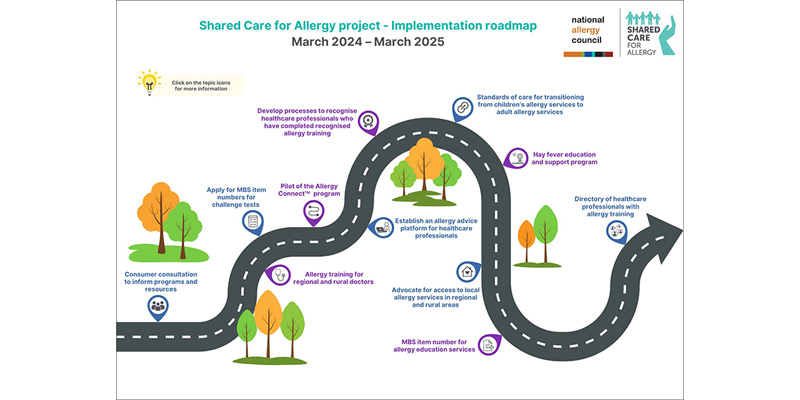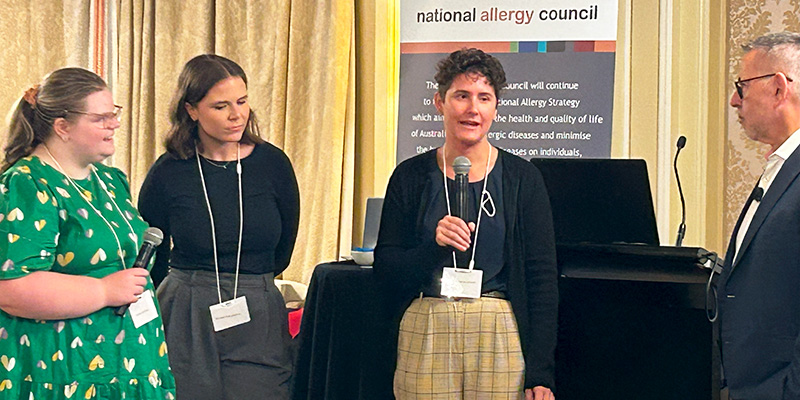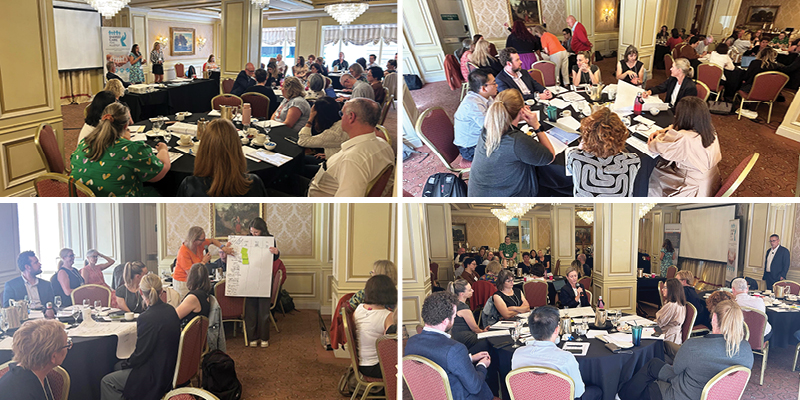Shared Care for Allergy Bulletin March 2024 - Edition 7
Welcome to the 7th Edition of the Shared Care for Allergy Bulletin! We are excited to keep you informed about the latest developments with the Shared Care for Allergy project. Our goal is to improve access to care for people living with allergic conditions. Here are the latest updates.
Where we are headed - a roadmap for the next year
Thank you to everyone who has been involved in the conversations about how to improve access to allergy care, particularly for people in rural and remote areas.
Based on the national consultations we identified five goals for allergy care for all Australians:
- Evidence-based care including appropriate use of allergy testing.
- Acceptable wait times to access high quality allergy care.
- Local delivery of care where possible.
- Being able to find healthcare professionals such as GPs, paediatricians, nurse practitioners, nurses and dietitians with additional training in allergy.
- Access to education and support from a range of healthcare professionals, and Allergy & Anaphylaxis Australia (A&AA), based on a person’s needs.
With these goals in sight, we have developed a roadmap for the next year that sets out key activities that the National Allergy Council, the Australasian Society of Clinical Immunology and Allergy (ASCIA) and A&AA will be progressing to drive change towards these shared goals.
View the roadmap to learn more about the activities being progressed between March 2024 and March 2025.

Managing the change from accessing children’s allergy services to accessing adult allergy services (transitioning care)
Part of improving access to care is making sure that people continue to get the care they need through the different stages of their life. Children with allergies who are seen at the children’s hospitals or by private paediatric specialists will eventually transition as young people to adult hospital services and to adult specialists.
In February, we held a meeting in Sydney with young people, parents, heads of hospital allergy departments and clinicians with experience in transition, facilitated by Dr Norman Swan. The purpose of this meeting was to talk about current issues in the transition of health care and what should happen for children as they approach teen years, during their teen years and after they become adults, to make sure they receive appropriate care.
It was agreed that there should be a formal transition process in place for young people who need it, with the right support and resources in place to make the transition successful. Good communication and flexibility, depending on the person’s needs, were key. There is a need to measure the outcomes and performance of the transition process to know if it is being done well.
The National Allergy Council will use the information and feedback received at this meeting to develop a national standard of care for this transition period so that young people continue to receive high quality allergy care. We would like to thank everyone who participated in the transitioning care meeting, especially the three young adults (pictured) who attended to share their experiences and the Trapeze staff who presented on the transition services they offer in NSW.

Pictured (left to right): Kara Gifford, Eloise Roelandts and Rhiannon Grant, Dr Norman Swan.

Pictured: Shared Care for Allergy transitioning care meeting, February 2024.
Updates from our partners
The National Allergy Council continues to work alongside the Australasian Society of Clinical Immunology and Allergy (ASCIA) and Allergy & Anaphylaxis Australia (A&AA), to progress the many different parts of the Shared Care for Allergy project, along with the National Allergy Centre of Excellence (NACE), who are providing research support.
Education and training update from ASCIA
ASCIA are:
- Conducting surveys to find out how allergy and anaphylaxis training is being provided in university courses. The current survey is open to people who are involved in the development and delivery of allergy training for health professionals and closes on 17 March 2024.
- Compiling reports based on feedback from all ASCIA anaphylaxis and allergy e-training courses which will guide course improvements. Once completed, these reports will be available open access at https://www.allergy.org.au/ascia-reports
- Updating patient and carer resources to include links to patient and carer support organisations at the start of each document, simplifying language and improving the format. The addition of a Patient and Carer Information tile to the ASCIA website homepage with links to these resources now makes it easier for patients and carers to access these organisations.
- Continuing to work with the National Allergy Council on application to government that will improve access to food and drug challenges.
Update from A&AA
A&AA are:
- Organising two webinars to provide information and support to people in the community managing medication (drug) allergy and food allergy. The webinars, presented by experts, will help improve consumer understanding of medication (drug) allergy and explain the new Plain English Allergen Labelling (PEAL) legislation. The live webinars are being held in April and June, and the recordings will be available from the A&AA website. Consumers can subscribe to A&AA to be informed about webinar dates.
- Surveying their members and followers to learn more about whether the services and resources provided by A&AA are meeting the needs of multicultural communities. A&AA Allergy Educators are also attending events in multicultural communities to increase awareness of the services and resources on offer and identify needs. They continue to establish new partnerships with key people and organisations representing multicultural communities.
- Working in partnership with the NSW Food Authority to understand community needs through interviews with people about how they manage their food allergies.
- Developing a new and user-friendly website for people with allergies, their carers, and anyone looking for information and support.
- Continuing to review all resources for people with allergies and their carers to ensure they have current information and are written in plain English.
Update from NACE
The NACE are finalising a Shared Care scoping review to identify and describe shared care models in allergy from the literature. Their findings on the key features and outcomes will be published and can be used to inform future implementation of allergy care models within the Australian healthcare context.
Contact the National Allergy Council
To contact us, please email
Find out more about the National Allergy Council.
Stay informed about the National Allergy Council
Stay informed by remaining subscribed to our newsletters and follow us on social media via Facebook, LinkedIn, Instagram or Twitter.

